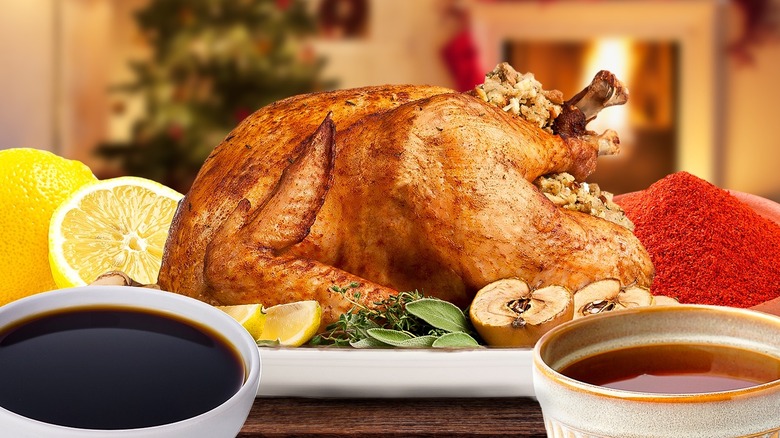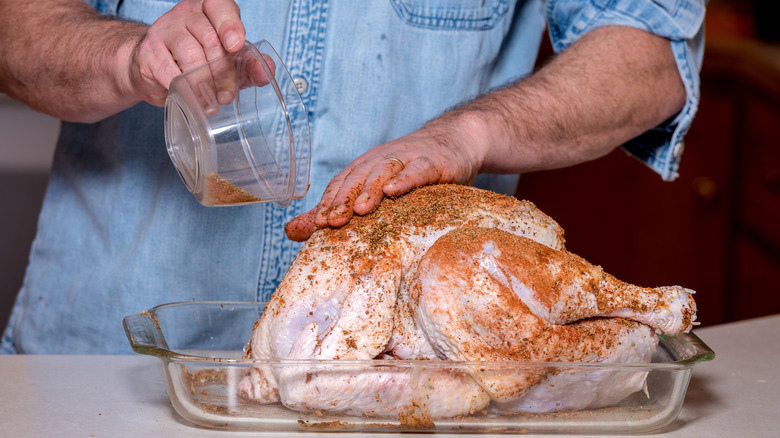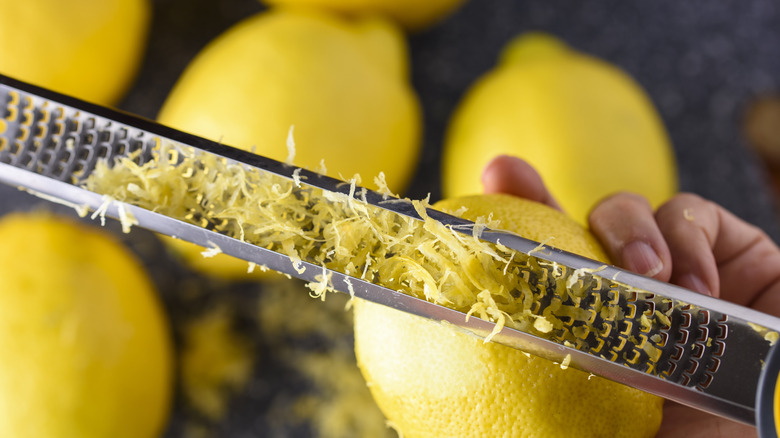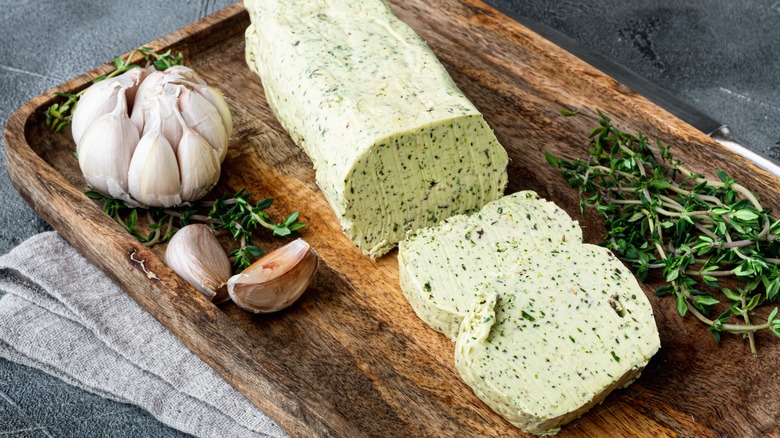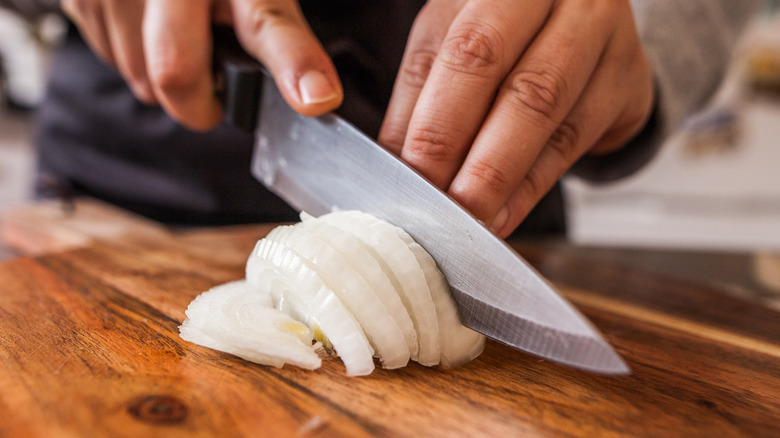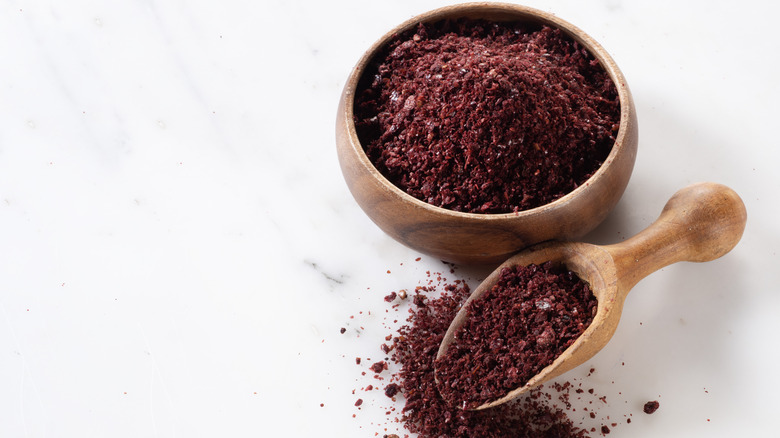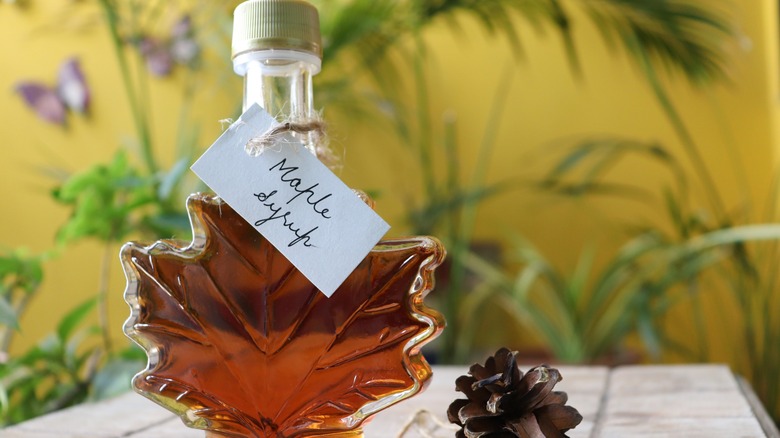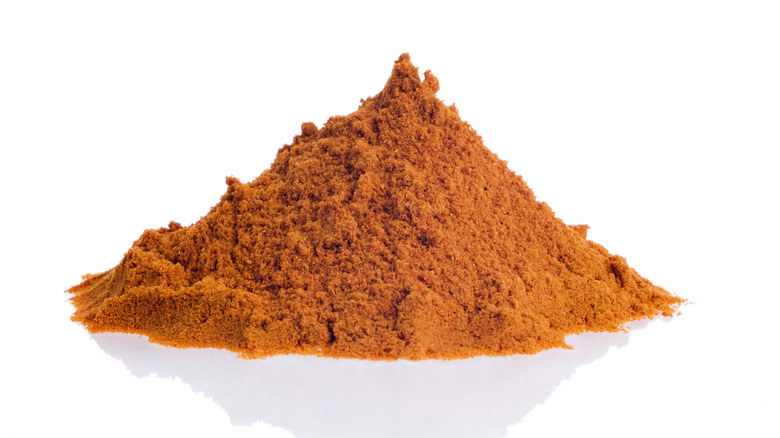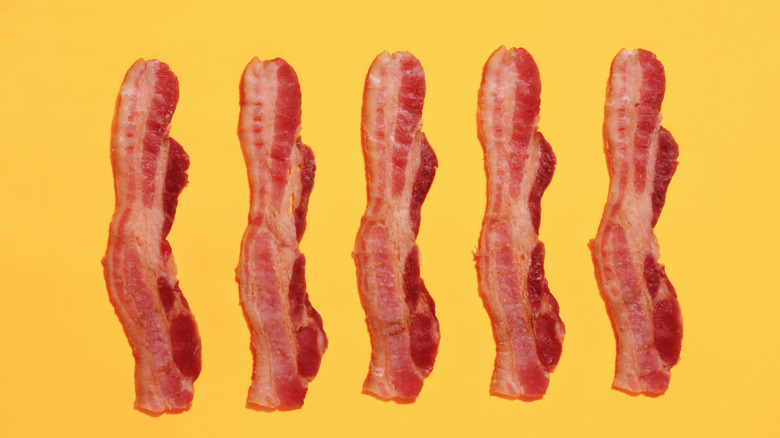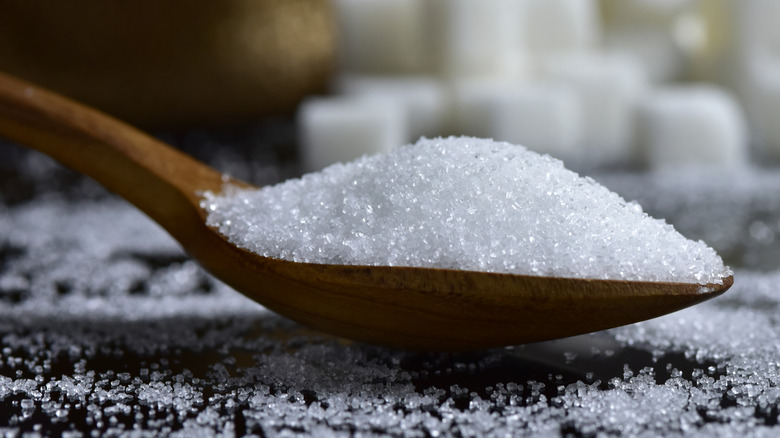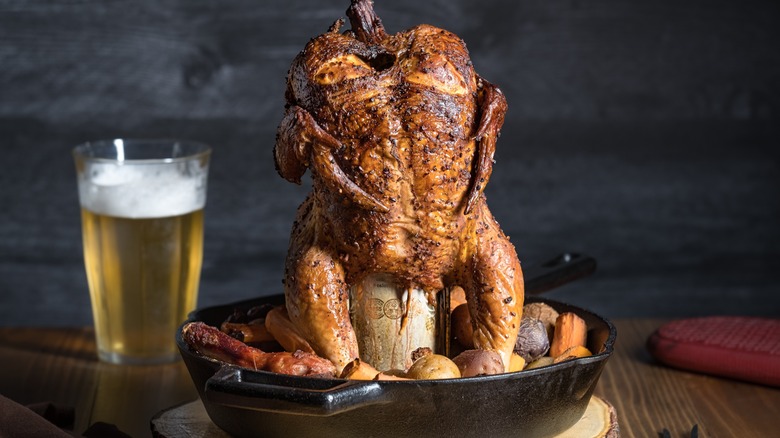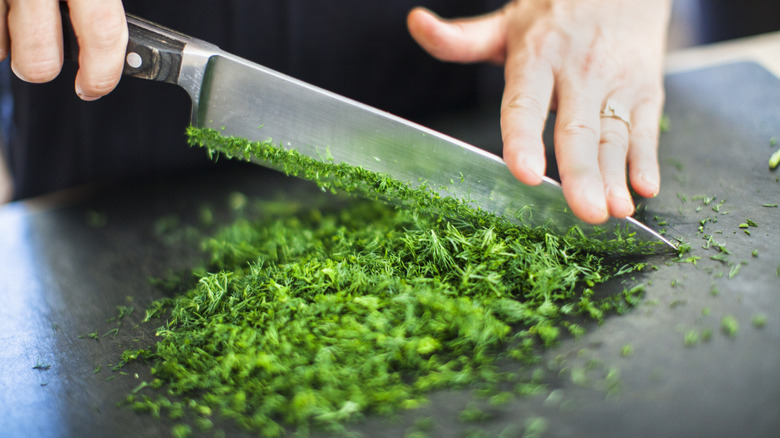6 Ingredients To Upgrade Your Roast Turkey And 6 To Avoid
With the holiday season in full swing, there's a lot of talk of cooking and eating turkey and how best to cook it. While some rely on family recipes that have been passed down through generations, others think every year is an opportunity to try something different. Though there are many ways to cook turkey, I always prefer to do a classic roast and let the oven do most of the heavy lifting. With roast turkey or any cooking method, it's important not to forget how to flavor the big bird. It's not always the easiest dish to get right. The sheer size makes it a little tougher to get flavors to get deeper beneath the skin. That's why, whichever flavoring you choose, giving it enough time to marinade is often the trick.
When it comes to flavorings, there are countless options. This can all come down to your personal taste and preference, but trying something new can be a rewarding experience. Either way, injecting as much flavor as you can into this holiday staple can take it from bland to spectacular. As a recipe developer who has cooked my fair share of turkeys for personal and professional reasons, I've found that a few simple ingredients can make all the difference and make for a tasty and juicy centerpiece. However, I've also tried a few additions that weren't so successful and delivered mediocre results. To help you achieve better results and avoid mishaps, here are reliable ingredients to upgrade your roast turkey and some that you should avoid.
Dry rub
Though it may seem intimidating at first, when it comes down to cooking turkey, you don't need much to make it delicious. To start with the basics, consider dry rub as one of the easiest and most effective ways to make a tasty turkey. You may already have everything you need in your pantry. Using a combination of dried herbs, spices, and salt, you can make your own dry rub blend. Making your own version is recommended because you get to decide what to put in it, but you always have the alternative of buying a ready-made mix.
Dry rub is an amazing option as you can also use it to brine your turkey, as long as you remember to add salt to your rub. All you have to do is rub it all over the bird and leave it to marinate for a couple of days. Don't forget to apply the rub liberally under the skin of your turkey, too.
If you want to take dry rub to the next level, make sure to toast your spices. Toasting helps unlock deeper flavor by releasing natural oils and aromas. All you have to do is add spices to a dry pan, either whole or ground, and toast on low or medium. This process doesn't take long and can be done in under a minute or two. When you notice the color getting deeper and light smoking, give them a good toss in your pan and voila, you've got your toasty spices.
Citrus
As a dish, turkey can be rich, salty, and packed with umami. All these things are desirable, but it won't be perfectly balanced without the addition of something acidic. Adding a touch of acid can lift the whole dish, cut through the fat, and bring out other nuances and flavors. That's why you should always include citrus in your turkey. A couple of lemons can seriously upgrade your roast turkey, especially if you use the juice and the zest.
I like to include zest in my dry rub, allowing all the natural citrus oils to slowly infuse into the flesh. Stuffing the cavity with lemon slices is also a great idea, and when the turkey is done, I also like to squeeze some of the juice onto it and, though it may be controversial, add some lemon juice into the gravy. You only need a few drops to make everything taste just a little bit brighter.
You also don't need to strictly stick to lemons as many other citrus fruits work. A common tradition is to make a turkey with oranges. This combination is particularly interesting because along with all other flavorings, they also add a pleasant sweetness.
Compound butter
Butter can make anything taste better, and it's definitely a go-to for making a juicy and luxurious roast turkey. It coats your bird with fat, keeping it moist and allowing you to baste it as it cooks. Butter is already perfect as is, but it's also the perfect vessel for delivering even more flavor to your turkey, and the best way to do that is to use a simple technique to make compound butter. If you've never heard of it before, compound butter only sounds fancy and complicated, but it's quite the opposite. You just have to combine butter with herbs, spices, or aromatic ingredients. You can do it manually with softened butter and a spoon, or you can throw everything into a food processor.
There are endless options when it comes to possible combinations. One of the simplest is to combine butter and garlic. Just imagine some garlic butter slathered all over your turkey. That's enough to instantly upgrade it. You can also add spices, herbs, or more extravagant additions like truffles to take everything to the next level.
Onions and scallions
The humble onion can be a game changer for roast turkey. This isn't a novel idea by any means, but why go for something else if the classics are reliable and always taste good? Onions are incredible with turkey because they are packed full of delicious flavor, which enhances during the slow roasting process. People don't often realize that onions are full of juice, which is why they take a long time to break down, making them perfect for the long and slow cooking methods such as roasting. As it cooks, the juice will drip into the turkey meat and keep it moist.
One of my best kept-secrets is adding chopped, raw onion underneath the skin of the turkey. The juice drips into the meat, and the onion caramelizes under the skin. It's just one ingredient, but it does so much. You can also use different kinds of onions to add different nuances and flavors. Along with brown or yellow onions, I like to add some scallions, which ramp-up the flavor even more.
Sumac
I love to play with different spices to create different flavor profiles in my turkey. One spice that I return to time and time again is sumac, a spice I'm familiar with because of my Middle Eastern heritage. Made from sumac berries, this crimson red spice is pleasantly tart and often paired with meat. Somewhat similar to lemon, sumac also adds an earthy quality. It's a spice I often use with poultry because it brightens the meat and makes it incredibly fragrant. Naturally, it works the same way with turkey. I even prefer to pair it with turkey, because turkey meat calls for bold flavors to bring out its best characteristics.
You can incorporate sumac into your dry rub or let it shine on its own, along with some salt and pepper. I've even used sumac as a finishing spice on my turkey with great success. You won't regret giving it a try.
Soy sauce
As roast turkey is considered to be an original American tradition, people often stick to classic combinations and shy away from pairing it with more unusual flavors. Choosing tried-and-true flavorings is not problematic, but you might miss on very creative and delicious pairings. Finding inspiration in other cuisines will open a whole new world of incredible ingredients that will make your cooking more diverse and dynamic. Soy sauce may not be the first thing you think of when flavoring turkey, but once you try it, you'll realize that it is a perfect match with roast turkey.
Soy sauce has a deep umami quality, which enriches turkey meat in the most delicate way. Because of its saltiness, it is also great for brining, while the dark color adds a beautiful golden brown hue. You can brush it all over your turkey, both over and under the skin. Additionally, you might want to consider adding a splash of soy sauce to the gravy.
Avoid maple syrup
In some households, maple syrup is a go-to ingredient for enabling caramelization and adding extra sweetness to roast turkey. While it may taste good, I've found that there are too many ways it can go wrong. Firstly, the obvious thing is that it will burn really quickly in your oven. If you baste your turkey with maple syrup while it's cooking, the sugar content tends to burn relatively quickly. You can really only apply it at the end of cooking if you want to avoid this.
The other problem is that maple syrup has a thin consistency and doesn't adhere well to the turkey when you brush it on. Often, it slips right off. The solution is to make a glaze with other ingredients that will help thicken it. Still, you can only brush it on towards the end of cooking to avoid burning. For these reasons, I recommend avoiding it altogether when roasting turkey. There are so many better ways to upgrade your turkey.
Avoid paprika
Paprika is one of my favorite spices, and because it's such a crowd-pleaser, I'm sure I'm not alone in wanting to apply it to everything. It's one of those spices that can make anything taste better, and I love adding it to chicken, fish, potatoes, carrots, beans, and steak. Essentially, it works with most savory dishes. Though I am inclined to add it to roast turkey, sadly, it's not a good idea as paprika is quick to burn. I've even had it burn on roast chicken before, which takes a significantly shorter time to cook than turkey.
If you've ever used a dry rub or spice blend that's burned while roasting, it's likely that it contains paprika. That's why it's best to make your own spice mix or at least check the ingredients on your store-bought blend. As tasty as it is, paprika naturally has a high sugar content, making it burn really quickly when heat is applied. If you must add paprika to your turkey, it's best to sprinkle some after cooking. Otherwise, you'll have a turkey covered in charred, bitter spices that will not be pleasant to eat.
Avoid bacon
A lot of people who claim they dislike turkey say that they find that it's just too dry. Turkey breasts are the most common culprit as this white meat cut cooks at a quicker rate than the rest of the bird, causing it to overcook and dry out. People resort to various methods to prevent this from happening, and while some of these work, some are not so successful. One of the most common ways to prevent the turkey from drying out is to lace bacon strips across the turkey breast while it's cooking. In theory, bacon is fatty and will add extra basting juices to the breast as the fat melts. Also, as bacon is a flavor powerhouse, you'd expect that it will impart a lot of its qualities. However, in reality, bacon tends to make everything unnecessarily greasy and doesn't work the way we imagine it would.
In the oven, bacon cooks way quicker than turkey, resulting in overcooked, dry, and brittle strips. At the same time, the strips cover the skin and prevent it from browning and becoming crispy . What you're left with is a greasy turkey meat topped with a soggy skin and sealed with dry bacon on top. That's why I don't think it's an effective ingredient for roasted turkey.
Avoid sugar
Sugar is one of those confusing things that's often included in turkey recipes. People like to include granulated or caster sugar in their rubs because it does help with browning. Though there is merit in the idea, the sugar should be removed before the turkey goes into the oven. This is a trap many people fall into because a lot of recipes don't clearly state that the rub — if it contains sugar — is meant to be wiped off from the turkey before you cook it. As we know, sugar burns at high heat, and this means that the sugar you add to your turkey will burn before the meat has had any chance of cooking.
It's best to avoid it completely, even in your dry rub. There are plenty of other ways to achieve the wonderful browning and perfect crisp on the skin without the risk of burning the bird. Even if you like adding sugar to your dry brine and remember to remove it, it's not easy to make sure you've removed all of those pesky sugar crystals, and you will often miss some them.
Avoid beverages like beer, wine, and cola
Beverages like beer, wine, and even cola can be effective ingredients when making different meats and roasts. We've all likely tried a succulent beer can chicken or coq au vin. And if you've never tried a cola Christmas ham, I'm sure you can imagine how much flavor it can pack. All these drink-laden recipes exist for a reason, and they really work in a variety of ways. However, this often doesn't translate to roast turkey as it's more temperamental and takes skill and practice to master.
Turkey is difficult to get right mostly because of its proportions. Hoisting a turkey on a beer can isn't an easy thing to do, and unless you have an extra large beer, it's likely that your bird will be too big for your can. Additionally, even though you want to inject moisture into your turkey as much as possible, using straight-up liquid isn't actually the way to go. Liquid will fall right off, and it will take any seasonings and spices along with it. Instead, it's much better to use fat and drippings as they tend to stick to the meat, creating a seal that will keep the juices locked in. Unless you are a highly skilled cook, the best idea is to skip these beverages when it comes to roasting. However, you could use any of these options and incorporate them into the sauce.
Avoid fresh herbs
Adding fresh herbs to the list of what not to use to flavor turkey is slightly controversial, as they are something we commonly reach for any time we want to upgrade a savory dish. They're beautifully fragrant and add a lovely freshness to most dishes. However, it's not the same with roast turkey. Fresh herbs are at their best when they're not cooked, or they should be added at the end of the cooking process. Any extensive cooking, including roasting, will make them lose flavor and vigor. Considering the long roasting process when cooking turkey, the addition of fresh herbs doesn't seem like a reasonable idea.
Fresh herbs won't make your turkey taste worse, and you can still shove some parsley into the cavity if you want. However, adding fresh herbs to your turkey and thinking they'll add a lot of flavor and freshness is misguided. Unless you throw them in during the last minutes of cooking, they won't have much effect. That's why I tend to leave them out and instead opt for dried herbs, which actually impart bounds of flavor during cooking. Just remember that dry herbs also lose potency over time, so make sure to regularly replace your dry favorites.
